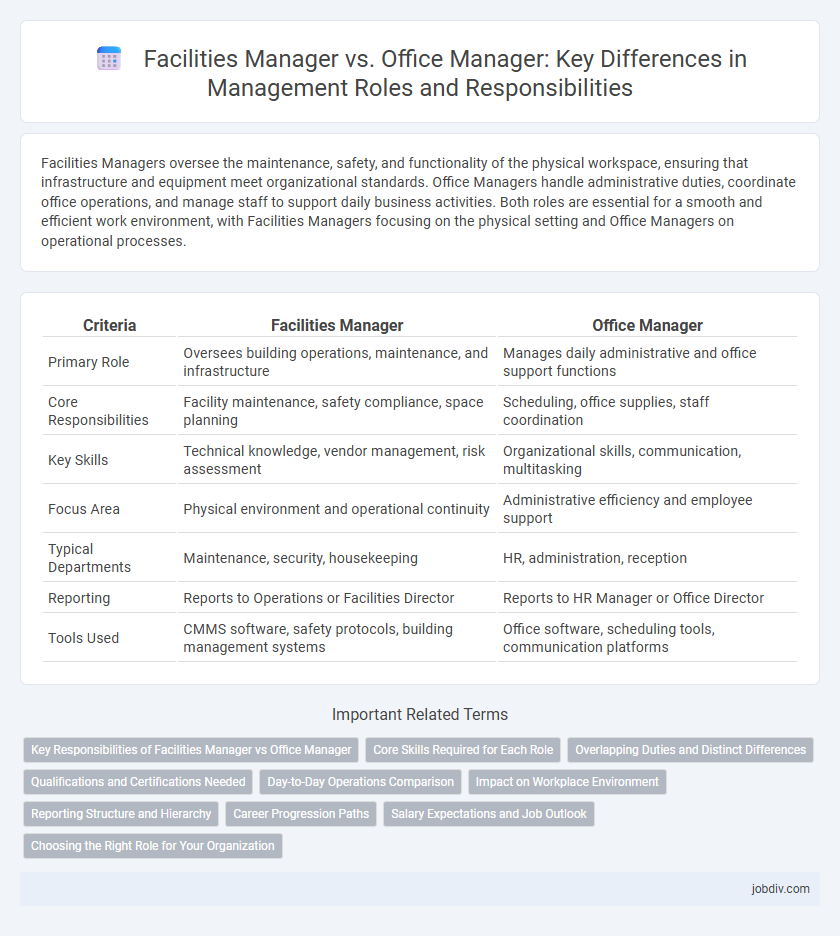Facilities Managers oversee the maintenance, safety, and functionality of the physical workspace, ensuring that infrastructure and equipment meet organizational standards. Office Managers handle administrative duties, coordinate office operations, and manage staff to support daily business activities. Both roles are essential for a smooth and efficient work environment, with Facilities Managers focusing on the physical setting and Office Managers on operational processes.
Table of Comparison
| Criteria | Facilities Manager | Office Manager |
|---|---|---|
| Primary Role | Oversees building operations, maintenance, and infrastructure | Manages daily administrative and office support functions |
| Core Responsibilities | Facility maintenance, safety compliance, space planning | Scheduling, office supplies, staff coordination |
| Key Skills | Technical knowledge, vendor management, risk assessment | Organizational skills, communication, multitasking |
| Focus Area | Physical environment and operational continuity | Administrative efficiency and employee support |
| Typical Departments | Maintenance, security, housekeeping | HR, administration, reception |
| Reporting | Reports to Operations or Facilities Director | Reports to HR Manager or Office Director |
| Tools Used | CMMS software, safety protocols, building management systems | Office software, scheduling tools, communication platforms |
Key Responsibilities of Facilities Manager vs Office Manager
Facilities Managers oversee building maintenance, safety compliance, and space planning to ensure operational efficiency and a safe working environment. Office Managers handle administrative functions such as staff coordination, office supplies management, and scheduling to facilitate daily office operations. Both roles require strong organizational skills, but Facilities Managers focus on the physical workplace infrastructure while Office Managers prioritize administrative support and employee coordination.
Core Skills Required for Each Role
Facilities Managers require expertise in building maintenance, safety compliance, and vendor coordination to ensure operational efficiency and workplace safety. Office Managers focus on organizational skills, communication, and administrative support to streamline office processes and enhance team productivity. Both roles demand problem-solving abilities and leadership to manage resources effectively and maintain smooth daily operations.
Overlapping Duties and Distinct Differences
Facilities Managers oversee the physical workplace environment, including maintenance, safety compliance, and space planning, while Office Managers handle administrative tasks like scheduling, office supplies, and staff coordination. Both roles share overlapping duties in managing vendor relationships, budgeting, and ensuring operational efficiency within the office setting. Distinct differences lie in Facilities Managers' focus on infrastructure and physical assets, compared to Office Managers' emphasis on administrative support and employee interaction.
Qualifications and Certifications Needed
Facilities Managers typically require a bachelor's degree in facility management, engineering, or business administration, along with certifications like Certified Facility Manager (CFM) or Facility Management Professional (FMP) to demonstrate expertise in building operations and maintenance. Office Managers often hold degrees in business administration or office management and benefit from certifications such as Certified Administrative Professional (CAP) or Microsoft Office Specialist (MOS) to enhance administrative and organizational skills. The distinct qualifications reflect the Facilities Manager's technical focus on infrastructure and compliance versus the Office Manager's emphasis on office coordination and staff management.
Day-to-Day Operations Comparison
Facilities Managers oversee the maintenance, safety, and functionality of physical buildings and infrastructure, ensuring operational continuity through regular inspections and vendor coordination. Office Managers focus on administrative tasks such as scheduling, supplies management, and supporting staff productivity within the office environment. Both roles require strong organizational skills but differ in scope, with Facilities Managers handling tangible assets and Office Managers managing workflow and personnel support.
Impact on Workplace Environment
A Facilities Manager ensures the physical workspace is safe, efficient, and well-maintained, directly affecting employee comfort and operational productivity. An Office Manager focuses on administrative support, streamlining daily workflows and enhancing communication, which boosts team collaboration and morale. Both roles contribute to a positive workplace environment but through distinct channels: infrastructure upkeep versus organizational efficiency.
Reporting Structure and Hierarchy
Facilities Managers typically report to senior management such as the Director of Operations or a Chief Operating Officer, overseeing the physical workspace, maintenance, and safety compliance. Office Managers usually report to department heads or the office director, managing administrative staff, daily office operations, and internal communications. The Facilities Manager holds a specialized role focusing on infrastructure and environment, while the Office Manager handles broader administrative functions within the organizational hierarchy.
Career Progression Paths
Facilities Managers typically advance by gaining expertise in building operations, project management, and compliance certifications, moving into roles like Senior Facilities Manager or Director of Facilities. Office Managers often progress by developing strong administrative, budgeting, and personnel management skills, transitioning into positions such as Operations Manager or Chief Administrative Officer. Both career paths benefit from leadership experience and cross-functional collaboration to reach executive-level management.
Salary Expectations and Job Outlook
Facilities Managers typically command higher salaries than Office Managers, with average annual earnings ranging from $60,000 to $90,000 depending on location and industry. The job outlook for Facilities Managers is robust, driven by increasing demand for efficient workplace operations and sustainability initiatives. Office Managers earn between $40,000 and $60,000 annually, with steady employment growth supported by businesses' ongoing need for administrative oversight.
Choosing the Right Role for Your Organization
Choosing the right role between Facilities Manager and Office Manager depends on your organization's specific needs and priorities. Facilities Managers specialize in maintaining physical environments, managing building operations, safety, and equipment, while Office Managers focus on administrative support, staff coordination, and office workflow efficiency. Assessing whether your organization requires technical infrastructure oversight or daily administrative management guides the optimal role selection for operational success.
Facilities Manager vs Office Manager Infographic

 jobdiv.com
jobdiv.com